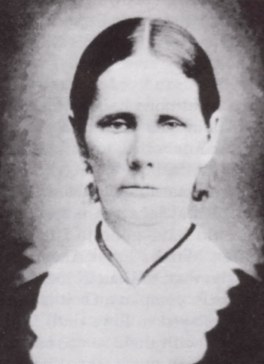Samuel Buchanan Frost
After
the American Colonies had won their independence from Great Britain,
they were also granted possession of the land between the Appalachian
Mountains and the Mississippi River. This territory was divided up
and attached to the various states. For example, What was to become
the State of Tennessee was a territory of North Carolina.
Frontiersmen began pushing over the Appalachians and had settled the
region. Davy Crockett was born in Greene County in Eastern Tennessee
in 1786. Ten years later, Tennessee became the sixteenth state of the
Union. Over the next twenty years, with the Tennessee frontier
conquered and tamed, the population began to swell as more and more
settlers sought land, opportunity, and growth.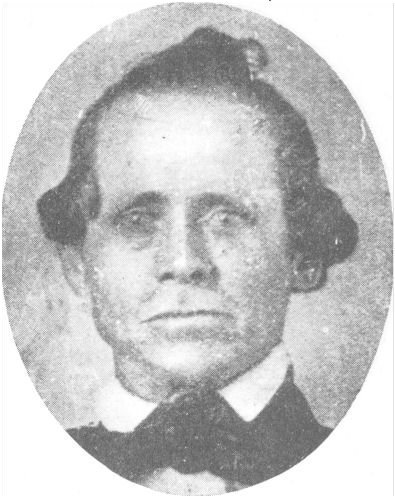
Before he was six years old Samuel Buchanan Frost, who was born January 2, 1810 in Wake County, North Carolina, moved with his parents and younger sister, Nancy Ilewood (11 Aug 1812), to Knox County in Eastern Tennessee. Samuel was the first child of McCaslin and Pennina Smith Frost. After settling in their new home, five more sisters and a brother were added to the family. They were: Isabelle VanDyke (14 Feb 1816), Fereba Smith (17 Sep 1818), James William (30 Aug 1820), Martha McKinney (7 Oct 1825), Mary Ann (27 Oct 1827), and Margaret Elzira (28 Apr 1830).
As a boy, he grew up knowing the weariness of toil, the joy of honest labor, and the value of home grown entertainment. Times were hard during that period and when Samuel was a young man he went north to Illinois and secured work. He liked the country and the opportunity it afforded and decided to remain there.
On the 7th of August 1834 in Hancock County, Illinois, Samuel married Rebecca Foreman. She was the youngest child of John and Hettie Horn Foreman and was born in White County, Tennessee November 20, 1820. John Foreman was a drinking man and the family had trouble over it. Hettie took Rebecca and left home in the night after John had threatened her life. John wanted to get Rebecca back even by force. Samuel married her to keep him from taking her. She was 14 and Samuel was 24.
Their first three children were all born in Hancock County; Mary Angeline (16 Mar 1836), Sarah Georgina (19 Oct 1837), and Nancy (22 Apr 1840). By the time Nancy was born, refugees fleeing religious persecution in Missouri began streaming into Hancock County and settled in a mosquito infested swamp at Commerce along the bank of the Mississippi River.
These newcomers, called Mormons, were an industrious people and set about to drain the swamp. Soon their settlement was incorporated into Commerce and the name was changed to Nauvoo, a Hebrew word meaning “beautiful city.” Navuoo began to grow as the Mormons built a thriving city. More Mormons began arriving from various parts of the country and Europe, particularly Great Britain, as their fledgling church, The Church of Jesus Christ of Latter-day Saints, which had only been founded ten years earlier began to grow as result of their missionary efforts.
Samuel became acquainted with members of the church and became converted himself. He and Rebecca were baptized in January of 1840. He was very enthusiastic over his new found faith and spent the rest of his life an ardent Latter-day Saint. Samuel was a Free Mason before he became a member of the Church. By trade he was a blacksmith.
Samuel went back to his old home in Tennessee to visit his family and tell them of the gospel of Christ. Early in the spring of 1841 Samuel went from Bear Creek, Illinois to visit his family, He converted his people and a number of the neighbors. A hole had to be cut in two feet of ice to baptize his parents and part of the rest of the family. Margaret was too young; Fereba was married and away; and Isabella never did join the church because of her husband's objections. As a result quite a community of people moved in a body to Nauvoo to be with the Saints.
Samuel was ordained an elder in Nauvoo, November 20, 1841. But soon after he was ordained a Seventy and appointed Second President of the Eighth Quorum of Seventy. The journal history of the Church for March 10, 1842 mentions that his continued absence in the East made a vacancy in the presidents of that Quorum. At the time he was serving his first mission.
A letter to the editor of the Times and Seasons from John D. Lee dated March 18, 1842 reporting on the progress of missionary efforts in Tennessee included mention of Elder Samuel Frost. “Elder Samuel Frost came to my assistance a few days after I arrived here and has been laboring diligently with me ever since to remove prejudice and erroneous notions that were imbibed [to take or receive into the mind] by many in consequence of false teachings; . . .” The letter goes on to say that Elders Frost and Linzey had baptized 22 people in Knox County.
After returning from this mission, Samuel and Rebecca lived in Nauvoo. In the fall 1842 he went to visit his three married sisters and some friends from Tennessee who lived in Jefferson County, Iowa, about 80 miles from Nauvoo. On October 3, 1842 Samuel wrote the following letter from there to Rebecca and his daughters in Nauvoo:
October the 3rd. 1842 Iowa, Jefferson Co.
Dearly Beloved kind and affectionate Companion:
It is with thanksgiving that I now embrace the opportunity of dropping a line of information and I hope that of consolation. I am in the enjoyment of good health & spirits for which I feel to thank the Lord, hoping these few lines may find you and those darling little babes enjoying the same blessings with all friends and connections & brethren. I have but one regret particularly; that is that I did not over rule Bro. Gordon so much as to hear what Bro. Joseph said the day we started. If you think it something that would be profitable to me, I want you (to) give it in your first letter to me. I cannot tell you yet where to write it.
The connections are all well and express their desires to see all of you and Fereba says she thinks she & William will make a visit this fall. As for the others I heard nothing of any of them coming. The subject of Wileys coming would not be much in my estimation. Isabelle seems piously disposed as usual and altogether friendly and affectionate. Mother is dead and the balance of the family is kind. We have only preached 3 times by appointment, but have been busily engaged by the fireside in preaching to all who are & were willing to hear. We were friendly and kindly received and treated in general. One exception only where we stopped to get some dinner in the round prairie at Mr. Gillum's. We have preached at Mr. Bealer's 8 miles from Old Thomas Smith's. The next time at Wm. Barber's. On yesterday, which was Sunday, we preached on Skunk River at George Langley's. The particulars of which Harmon will tell you when he delivers the letters. We think the prospect of doing good is very flowering not-with-standing persecution rages in the hearts of people, or some of them, yet. We don't care anything about that. We know it (will) out such as won't stand, if they were in, therefore it rids us of the trouble that’s more lasting and more fatal than it's self. Under this consideration we are able to rejoice amidst all, such as we have ever met with yet.
I want you to be faithfully engaged in the discharge of your duty and pray for me, always remembering my infirmities, and my want of divine aid in order to the discharge of my duty in the ministry, having left you in the hand of God and feeling that He is ever merciful to those who are under the oppression of any bereavement whatever. I therefore pray God the Eternal Father in the name of Jesus Christ His Son to keep you and preserve you from all harm and supply all your wants that you may be comfortably situated, counseled and consoled in my absence. I wish to write a few lines to the little girls.
Mary: Father wants you to
be obedient (to) your mother's instructions and not forget your book.
You know that Father wants you should be as smart as any little girl
in Nauvoo, and wants you to beat them all if you can. Mother must
teach you to write so that when she writes me a letter you can write
your name and age and send it to me.
Now Sarah I want to talk to you some. I want your curly head to be engaged in trying to beat all the little girls in Nauvoo. I want Mother also to teach you to write that you may write to Father your name and age in mother's letter. Be a good little girl. Mind what mother tells you. Be kind to little sister that you may set her a good example. The same is intended for you, Mary.
Rebecca I have good news for thee, and I want your prayers in behalf of the same. Fereba this morning proffered to believe in Mormonism, and Wm. said as much as to say the same last night to me. I can and do and will rejoice because of the blessings of God being and having been extended to us. I am glad I turned my course on my mission from East to North. Yea, I have reasons to thank the Lord for my prosperity in the ministry amongst those of my beloved friends according to the flesh. For this let the name of God be praised.
S. B. Frost to Rebecca Frost and family. Write immediately to Fairfield and I think I shall be able to get it before we leave here.
The Frosts were personally acquainted with Joseph and Emma Smith. When the Prophet came for a visit he sat the children on his lap. Although Samuel was five years younger than Joseph, he was never able to beat him in a wrestling match. No one could. Samuel and Rebecca's first son, William Anderson, was born in Nauvoo on May 16, 1843. After the loss of yet another baby, Joseph “borrowed” Baby William to take home to comfort Emma's empty arms. Sadly, William died on August 16, 1843 in Nauvoo.
Samuel left for a mission to Kentucky on the 15th of April 1844. His call was published in Nauvoo on May 15th. His father and brothers-in-law cared for his family while he was away. He was in Kentucky when the Prophet was martyred on June 27, 1844.
After
returning to Nauvoo, their fifth child, Hettie, was born on November
13, 1845. By February of 1846, persecution became so intense that the
Mormons were given no choice but to abandon their city and flee to
Iowa. In preparation for the exodus, Samuel being a blacksmith helped
get the wagons ready. After crossing the frozen Mississippi river,
the saints made there way across Iowa and regrouped at Winter
Quarters (which became known as Council Bluffs, Iowa) to prepare to
go on to the Rocky Mountains the following year. When the Mormon
Battalion was organized to go fight in the Mexican War he spent the
night mending shoes for them.
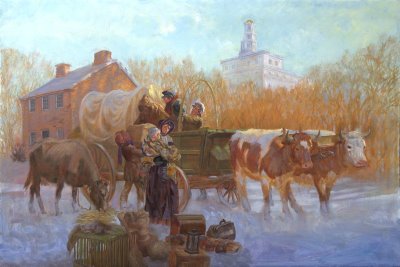
Nauvoo Exodous
Rather going on to the Utah Territory with the main body of the Church, the Frosts and others settled in Freemont County, Iowa which is about sixty miles south of Council Bluffs. They lived at the Stephen Coopers Cut-Off on the Council Bluffs-St. Joseph stage coach road, the cut-off allowed travelers to descend from the bluffs down into the Missouri River bottoms and travel a more level road along the base of the bluffs.
Samuel continued his trade as blacksmith but also was a successful farmer. He owned "fine stock horses" and was well enough off that he hired other men to work for him. At various times in his life he owned and successfully ran taverns. In those days, a tavern was a place for travelers to get a meal and rest for the night. His location on the main road between Council Bluffs and St. Joesph, Missouri would have been ideal for such an business. He held positions of prominence in Freemont County, including serving as a district judge.
Jerome Adams was one of those who found work on the farm of Samuel Buchanan Frost in Fremont County, Iowa. The first time he went into the Frost home to eat, he saw sixteen-year-old Mary Angeline and decided he would one day marry her. At that time he was only about eighteen years of age, and when he finally asked her to marry him the family had been snowed in for a week. He just sat by the stove under her feet the whole week and hadn’t said a word. When he finally got up courage to propose, she decided she liked him well enough to marry him and was never sorry she told him “Yes.”
When they went to get married in January, 1854, the judge questioned his age, and Jerome was not sure of his birth year. His future father-in-law who had gone with them pointed to Jerome’s full beard and told the judge that should be proof enough that he was an adult, so they were allowed to marry.
Five more children were born while they lived in Iowa: Samuel Buchanan, Jr (29 Mar 1849), George Washington (4 Jul 1850), James McCaslin (27 Aug 1852), John Wesley (14 Jul 1856), and Clay Annie (27 Sep 1857). Of these, George died on October 2, 1851, John only lived a short while and died in 1856, and Annie died the day she was born.
For two weeks after Annie was born, Rebecca suffered from complications with the birth. While she lay ill the family dog seemed to sense that death was near and in spite of anything they could do, he kept howling mournfully. This troubled Rebecca, so Samuel, sad and worried, determined to quiet the dog, beat him until he died.
Tragedy came to Samuel when Rebecca died at the age of 35 on October 9, 1857 leaving him with three young children to care for. Hettie, the oldest at 12 was able to help with the two little boys, Sam, Jr. age 8 and James age 5. The three older girls all lived in the area with their families as well.
When
the Civil War broke out Samuel brought his three married daughters,
Mary, Sarah, and Nancy, their husbands and children, his three
smaller children, Hettie, Samuel, Jr., and James, and his nephew
Abram Barger with him to Utah. The wagon company started out on May
20, 1861 from the home of Samuel B. Frost in Pleasant Grove, some six
miles south of Sidney. Among those who started from that place were
William K. McKissick, who was captain of the company, with his
family; Samuel Buchanan Frost and family, Jerome and Mary Frost Adams
and family, Valentine and Sarah Frost Acord and family, Abram and
Nancy Frost Acord and family, James A. Allred and family, Josh Hill,
Chauncy Paine, Henry Overaker, John Freeman, James Curry, Jonathan
Tipton, William Murray, Dave Murray, Ashton D. Green, and others,
making up a party of about twenty five men. The thirteen wagons in
the company were drawn by ox teams. About 400 head of horses and
cattle were driven along with the company.
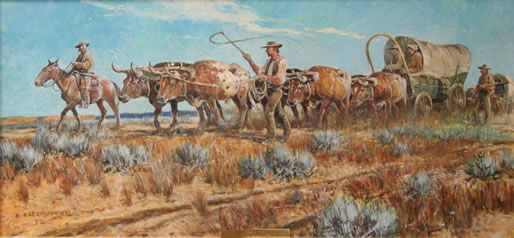
The company stopped at McKissick's Island, (On the Missouri River, southwest of Hamburg, Iowa) until June 5th, and during this time a child was born to Samuel's daughter, Nancy Frost Acord. Moving on, the party followed the old Mormon train across the plains and reached Salt Lake City August 20. Some of the company went on to California. The only accident of the entire journey was the slight injury to one of the men by the accidental discharge of his own gun. Many Indians were seen but all were friendly. Altogether the trip was a fortunate and enjoyable one.
Samuel's family had arrived in Utah in previous years. His sisters Martha and Margaret came in 1848 with their families. His parents crossed the plains in 1856 with his sister Nancy and her family. After arriving in the Salt Lake Valley, Samuel lived with the family of his sister, Margaret Rawlins, until he could have a house built for himself in Draper. His married daughters and their families soon found homes in other communities. Samuel was the Justice of the Peace of the Draperville precinct during 1862, and that he was active in church work there.
Samuel hired a young English
girl, Esther Davis, to keep house for his family, which she did with
credit to herself. Esther, had been married as a second wife to Henry
Woolcoat. But Esther was unhappy in this plural marriage so she took
her young son, Albert James, and left to make her own way. After
coming to work for Samuel, Albert, who was just over a year old, died
on March 5, 1864. 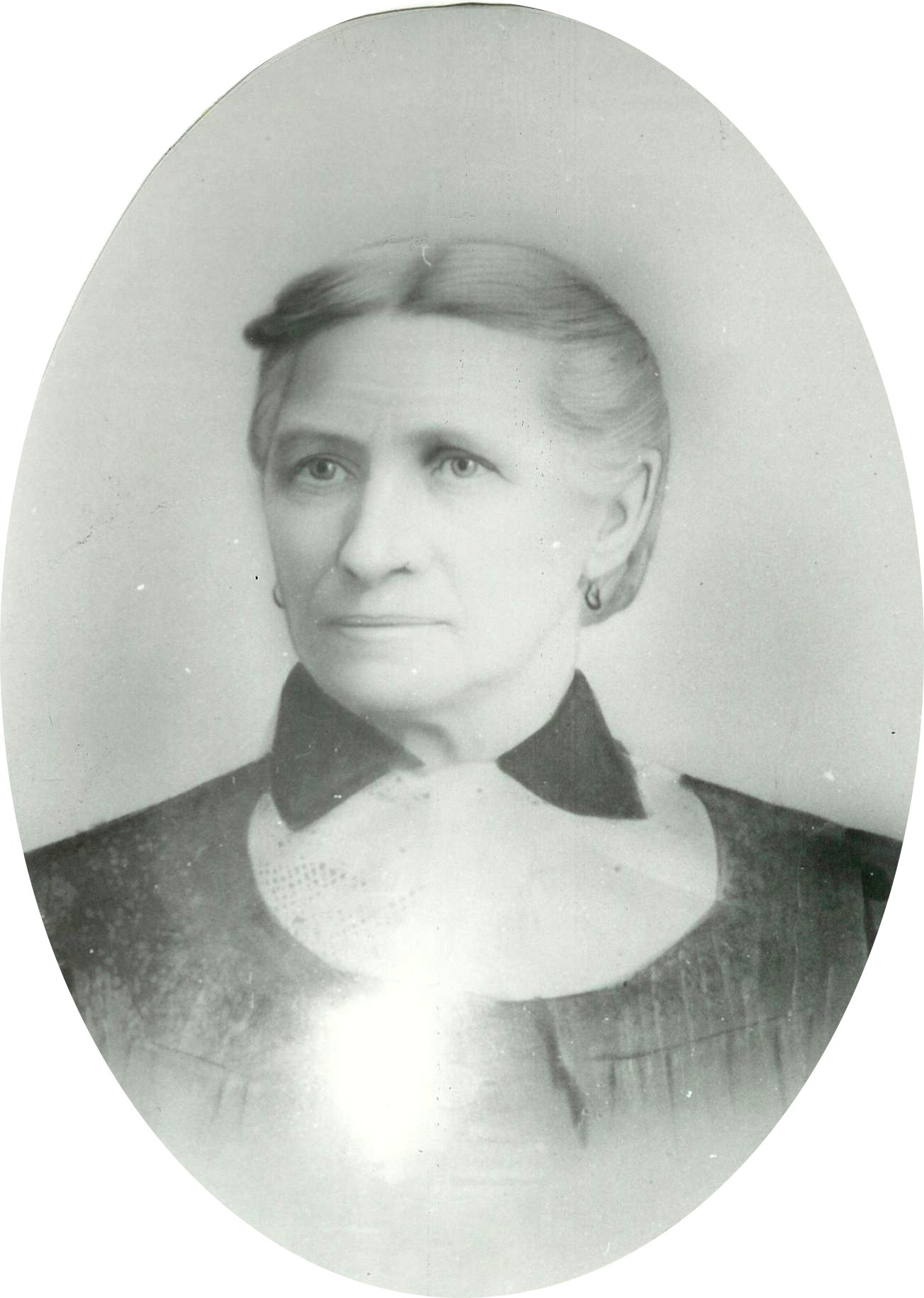
A painting of Esther Davis Frost later
in life.
On April 17, 1864 in Draper, Samuel and Esther were married. He was 54 and she was 25. She was born April 24, 1839 in Pauntley, Gloucestershire, England. Her parents joined the church when she was a child. Esther came to America when she was about 18. After living in Boston for about three years, she crossed the plains to Utah in 1861 with Captain Horne's Company. Esther walked most of the way so that her sister, who was not well and had two small children, could take her turn riding.
Soon after their marriage Samuel and Esther moved to Spring City, Sanpete County, Utah. There he farmed extensively, owned a fine home for the times, did carpenter work, blacksmithing and even shoe repair. He took an active part in Church affairs and community life. He was a Ward Teacher for many years and held every political position in the county. During the Black Hawk War in Southern Utah between 1866 and 1868 he was a Captain in the Territorial Militia and served his community fearlessly and well with advantage to them and credit to himself. People who knew him said he was a man without fear.
Samuel and Esther's seven children were all born in Spring City; Stephen (1 Apr 1865), Chauncy ( 8 Oct 1866), Rebecca Penninia (26 Sep 1868), Adolph Lesseau (15 Aug 1870), Margaret Elzira (30 Sep 1872), Ivan Danzoff (9 Jan 1875), and Marion (12 May 1878) During this time James McCaslin died in September 1868 at the age of 16.
Samuel and Esther were sealed in the Endowment House in Salt Lake City on May 23, 1870. At the same time he was also sealed to Rebecca by proxy.
Samuel was an intellectual man, cheerful in disposition, thoroughly democratic and always a friend to young people. All his life he loved music and singing and took an active part at parties and entertainments playing his "fiddle", and step dancing. He used the old violin made by his grandfather James Frost, and won by his father McCaslin for learning to use it first among James' seven sons. Samuel was a popular Fourth of July speaker and could deliver an inspiring oration.
Having a touch of puritan blood in him Samuel detested puffs and frills on women's clothes. He said they looked like "pigs guts." He thought they called unnecessary attention to a woman's figure and that the Lord meant women to be plain.
In
his old age he became extremely hard of hearing and gave his family
perverse answers to their questions - - - they thought intentionally.
He hated the wind and would say, "Blow, damn you! Don't I hate
you! Blow in a mans ears and drive him crazy."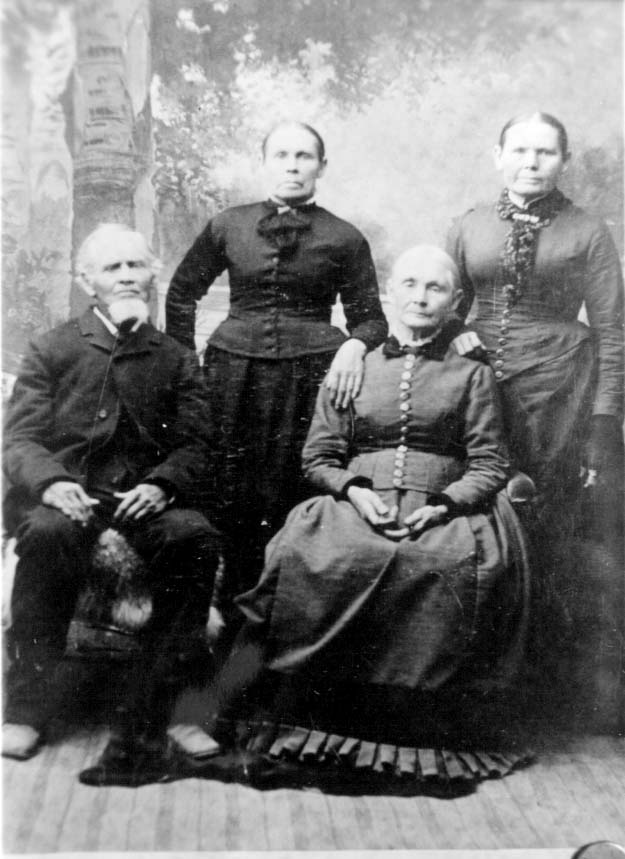
Samuel Buchanan Frost and his sisters,
Martha, Nancy, and Margaret in 1886.
On September, 15 1886 he met with a number of his sisters, children, grandchildren, and other relatives in the Logan Temple for ordinance work. At that time he was sealed to his parents and to his first four children.
Like Daniel Boone, Samuel wanted elbow room and lots of fresh air and disliked living in town. So when a friend persuaded him to move south to Coyote (now Antimony) in Garfield County, he planned to do so, though he was 78 years old. In the early spring of 1888 he fell from a haystack and broke several ribs, which never healed and made him ill most of the time. Nevertheless, they moved to Coyote on the 12th of May. He lived little more than a month. Samuel Buchanan Frost died June 27th, 1888 at Coyote on the east fork of the Sevier River where he was buried in a most beautiful natural graveyard. There is a background of low hills covered with timber to the west; the hundred foot wide Sevier River lined with cottonwoods curves through the hills at their feet.
An ever-increasing posterity lives after him to keep his example of sturdiness, faithfulness to a righteous cause living in their memories so long as his blood remains in the earth.
This story was complied from a history by Ira L. Frost, accounts from Mary Angeline Frost Adams, and Nancy Frost Acord, and The Times and seasons.
"Every person should be diligently engaged in that which pertains to his occupation. And in this way he will gain confidence and meet the approbation of his friends and surrounding acquaintances and obtain wealth and honor." Samuel B. Frost.
The following poem was written on the back of a letter to Rebecca.
A
composition of words I send,
the feeling of my heart
to children and that Bosom Friend
with whom I had to part.
The above as an introduction.
Below that which is introduced.
My Bosom Friend, and children too
I wish to write and say to you
Who on that lovely, happy land
I
had to give the parting hand.
You
know not what my feelings were
Neither can I them all declare.
To think upon that lovely band,
Who gave to me the parting hand.
Yet
duty calls me to proclaim
The gospel of Messiah’s name
And this enables me to stand
And give my friends the parting hand.
May
God draw near and cheer your hearts
Whilst
we are all so far apart,
But still I think in distant lands of them
To whom I gave the parting hand.
These
lines I write that you might see
And
whilst you read them think of me
Till again in Nauvoo stand
And give you all the meeting hand.
Song Ballad of the Great Liberty Tree, by Samuel B. Frost
In a chariot of light from the regions of day
The Goddess of Liberty came.
Ten thousand celestials directed her way.
And hither conducted the dame.
A
fair budding branch from the Garden of love
Where millions with millions agree
She brought in her hand as a pledge of her love
And the branch she named Liberty Tree.
The
celestial Exotic stuck it deep in the ground
Like a native it flourished and bore
The fame of its fruit drew the nations all around
To out our peaceable shore.
Unmindful of names or distinctions they came
For free men like brothers agree.
One spirit endowed, one spirit pursued.
And their temple was Liberty Tree.
Beneath this fair tree like the Patriarchs of old
Our bread in contentment we did eat,
Ne’er vexed with the troubles of silver and gold,
The cares of the grand or the great
With timber and tar we old England supplied
Supported her power o’er the sea.
Their battles we fought without gaining a cent
To the honor of Liberty Tree.
Hark! Hark! Hear ye swains, tis a tale most profane
How all the tyrannical powers Kings, Commons and Lords
United in vain to cut down this garden of ours!
From the East to the West blow the trumpet to arms
Through the land let the sound of it flee.
Yea far–yea hear unite with the cheer
In defense of our Liberty Tree.
Ye American ladies excuse us awhile
From doting your lovely charms
The fatigues of the war and the soldier in toils
We soon shall forget in your arms.
Then let us arise, our foe to chastise
Who repines at our living so free,
The laurels we reap we lay at your feet
And the soil that grew the Liberty Tree.
